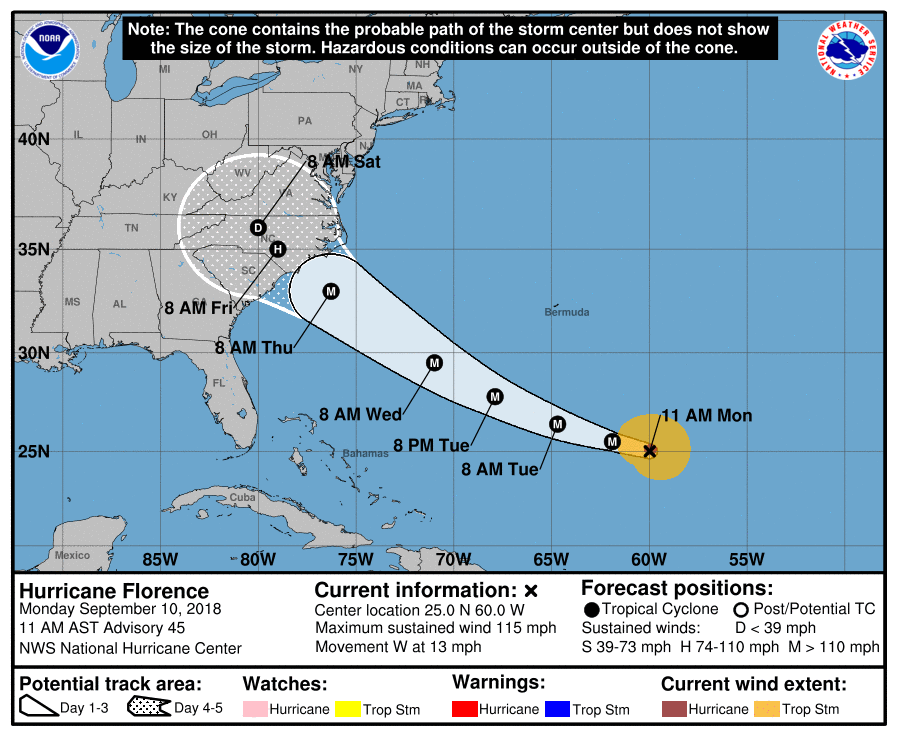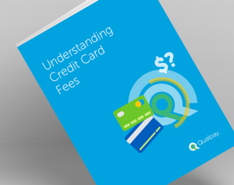Monday, September 10, 2018
(September 10, 2018) — Hurricanes are among nature's most powerful and destructive phenomena. On average, 12 tropical storms, six of which become hurricanes form over the Atlantic Ocean, Caribbean Sea, or Gulf of Mexico during the hurricane season that runs from June 1 to November 30 each year. In the Central Pacific Ocean, an average of three tropical storms, two of which become hurricanes form or move over the area during the hurricane season, from June 1 to November 30 each year. Guam, the Northern Marianas and Micronesia experience typhoons all year round but the main season in July through November with a peak from mid-August to mid-September. Over a typical 2-year period, the U.S. coastline is struck by an average of three hurricanes, one of which is classified as a major hurricane (winds of 111 mph or greater). By knowing what actions to take before the hurricane season begins, when a hurricane approaches, and when the storm is in your area, as well as what to do after a hurricane leaves your area, you can increase chances of survival. 
The National Hurricane Center reports as of 12:00 p.m. EST, Hurricane Florence was updated to a Category 4 hurricane. Florence is moving toward the west with a west-northwestward motion with an increase in forward speed is expected during the next couple of days. Satellite data indicate that maximum sustained winds have increased to near 130 mph (185 km/h) with higher gusts. Further strengthening is anticipated, and Florence is expected to be an extremely dangerous major hurricane through Thursday. A turn toward the northwest is forecast to occur late Wednesday night. On the forecast track, the center of Florence will move over the southwestern Atlantic Ocean between Bermuda and the Bahamas Tuesday and Wednesday, and approach the coast of South Carolina or North Carolina on Thursday.
Hurricane-force winds extend outward up to 30 miles (45 km) from the center and tropical-storm-force winds extend outward up to 140 miles (220 km). Surf swells generated by Florence are affecting Bermuda and portions of the U.S. East Coast. These swells are likely to cause life-threatening surf and rip current conditions with 20 inches of rainfall expected.
The Propane Education & Research Council (PERC) notes that each year, hurricanes endanger the lives of thousands of people and cause extreme property damage. A hurricane can be accompanied by tornadoes, thunderstorms, flooding, mudslides, and power outages. If your home uses propane, there are a few simple steps you can take to keep your family safe and avoid potential dangers. If you are a propane customer in the path of a hurricane, make sure you and members of your home or business are familiar with the following hurricane safety tips provided by PERC:
Taking these 10 simple steps provided by the Propane Education & Research Council can help promote safety all season long. With a little advanced planning, you, your family or business, and your customers, will be prepared for severe weather events such as hurricanes. For additional information on preparing for hurricanes and other severe weather conditions and natural disasters, visit propane.com. Propane retailers should share this information with customers and encourage them to contact their propane retailer whenever they have a weather- or safety-related question.

The National Hurricane Center reports as of 12:00 p.m. EST, Hurricane Florence was updated to a Category 4 hurricane. Florence is moving toward the west with a west-northwestward motion with an increase in forward speed is expected during the next couple of days. Satellite data indicate that maximum sustained winds have increased to near 130 mph (185 km/h) with higher gusts. Further strengthening is anticipated, and Florence is expected to be an extremely dangerous major hurricane through Thursday. A turn toward the northwest is forecast to occur late Wednesday night. On the forecast track, the center of Florence will move over the southwestern Atlantic Ocean between Bermuda and the Bahamas Tuesday and Wednesday, and approach the coast of South Carolina or North Carolina on Thursday.
Hurricane-force winds extend outward up to 30 miles (45 km) from the center and tropical-storm-force winds extend outward up to 140 miles (220 km). Surf swells generated by Florence are affecting Bermuda and portions of the U.S. East Coast. These swells are likely to cause life-threatening surf and rip current conditions with 20 inches of rainfall expected.
The Propane Education & Research Council (PERC) notes that each year, hurricanes endanger the lives of thousands of people and cause extreme property damage. A hurricane can be accompanied by tornadoes, thunderstorms, flooding, mudslides, and power outages. If your home uses propane, there are a few simple steps you can take to keep your family safe and avoid potential dangers. If you are a propane customer in the path of a hurricane, make sure you and members of your home or business are familiar with the following hurricane safety tips provided by PERC:
- In flood zone areas, make sure your large above-ground and underground propane tanks are anchored securely to avoid potentially dangerous situations. The National Fire Protection Agency (NFPA) requires that you do this. Contact your propane retailer for more information.
- Create an emergency preparedness plan and review it with everyone in your family. Post a list with contact information for your propane retailer and emergency services (fire department, etc.) along with instructions for turning off propane, electricity, and water. If you do need to turn off your propane, contact a service technician to inspect your propane system prior to turning it back on.
- Have an adequate supply of propane in your tank. During and after a major hurricane, propane and other types of fuel may not be readily available and roads leading to your home or farm might not be accessible for delivery.
- In the event that a hurricane threatens your safety, you should shut off the gas. Turn off the main gas supply valve on your propane tank, if it is safe to do so. To close the valve, turn it to the right (clockwise). Also, it’s a good idea to turn off the gas supply valves located near individual indoor appliances.
- Listen to your local authorities, or television and radio stations to determine if you need to evacuate your home or farm. If you do evacuate, use extreme caution when returning to your property. If you have any doubts about your safety, leave the area immediately and have your property inspected by a qualified building inspector or structural engineer before re-entering.
- After the hurricane danger passes and it is safe to do so, check the entire area for downed power lines, damaged gas lines, or damage to your propane tank. High winds and floods can move, shift, or damage gas lines and tanks. If it is dark, use flashlights, not candles. Immediately call your local utility company or propane retailer if any of these hazards exist. Do not attempt repairs yourself. If you find a propane tank on your property that is not yours, or if your propane tank has become dislodged or is missing, contact your propane retailer or your local fire department immediately.
- Never use outdoor propane appliances indoors or in enclosed areas, particularly during a power outage. This can result in carbon monoxide poisoning or death. These include such appliances as outdoor portable heaters, barbecue grills, and portable generators. Only use appliances indoors that are designed and approved for indoor use. It’s also important that you never store, place, or use a propane cylinder indoors or in enclosed areas such as a basement, garage, shed, or tent.
- Inspect your propane appliances for water or other damage, if it is safe to do so. If the appliances have electric components and have been exposed to water, they can create a fire hazard. Do not ever turn on a light switch, use any power source, or inspect your household appliances while standing in water. This can result in electrocution.
- Schedule a time for a qualified service technician to perform a complete inspection of your propane system if you suspect any of your propane appliances, equipment, or vehicles have been under water or damaged, or you have turned off your gas supply. Never use or operate appliances, equipment, or vehicles, or turn on the gas supply, until your system has been inspected by a qualified service technician. Do not attempt repairs yourself.
- Exercise sound judgment. As with any challenging situation, your composure during a hurricane and other severe weather events will ensure you don’t take unnecessary risks or pose any additional dangers to your family and home. Stay calm; use radios, television, and telephones to stay informed and connected. If any questions arise, contact your propane retailer or local fire department.
Taking these 10 simple steps provided by the Propane Education & Research Council can help promote safety all season long. With a little advanced planning, you, your family or business, and your customers, will be prepared for severe weather events such as hurricanes. For additional information on preparing for hurricanes and other severe weather conditions and natural disasters, visit propane.com. Propane retailers should share this information with customers and encourage them to contact their propane retailer whenever they have a weather- or safety-related question.




